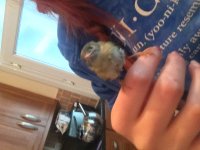CarysStokes
New member
(I'm new to this forum so I'm not 100% sure if I uploaded the image but I hope I did!)
Hi, so, earlier on my sister came home with a small bird that she thought was injured. I'm not sure what's wrong with him/her but it seems as though it's having trouble flying. Very friendly and docile! I've had it here since about 11am and have been feeding it cat food. I didn't want to feed it anything else as I'm not sure what type of bird it is! Does anyone know? What does this bird eat? How old? Advice?
Ah the moment I've got the bird in a fairly large hamster cage with some old news papers and the cat food in there with it along with a small bowl of water. I feel guilty keeping it but I also feel awful about letting it out in the wild when it can't fly. He seems to have no issues eating. Thank you for any help and advice it's greatly appreciated! Also just to let anyone know I've contacted the local vet and they refused to do anything as did the rspb. There are no local bird care shelters (?) around here that I know of.
Hi, so, earlier on my sister came home with a small bird that she thought was injured. I'm not sure what's wrong with him/her but it seems as though it's having trouble flying. Very friendly and docile! I've had it here since about 11am and have been feeding it cat food. I didn't want to feed it anything else as I'm not sure what type of bird it is! Does anyone know? What does this bird eat? How old? Advice?
Ah the moment I've got the bird in a fairly large hamster cage with some old news papers and the cat food in there with it along with a small bowl of water. I feel guilty keeping it but I also feel awful about letting it out in the wild when it can't fly. He seems to have no issues eating. Thank you for any help and advice it's greatly appreciated! Also just to let anyone know I've contacted the local vet and they refused to do anything as did the rspb. There are no local bird care shelters (?) around here that I know of.
Attachments
Last edited:




